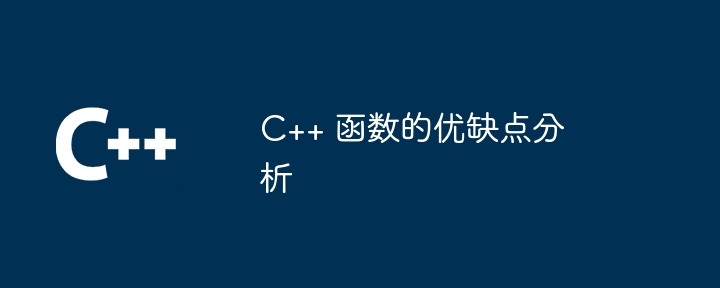
Advantages: Modular code, improves readability, code reuse, avoids repeated encapsulation of data and implementation details, provides namespace, avoids conflicts in passing parameters, and facilitates information transfer. Disadvantages: performance overhead, calls involving stack frame creation and destruction, excessive embedding The set affects readability and becomes more difficult to debug. Errors may occur at the calling location. Maintenance is difficult. The function may be called in multiple places.

Analysis of the advantages and disadvantages of C functions
Advantages:
Disadvantages:
Practical case:
Consider a function that calculates pi:
// 返回圆周率的近似值
double calculate_pi(int num_digits) {
double pi = 0;
int sign = 1;
for (int i = 1; i <= num_digits; i++) {
pi += sign * 4.0 / (2 * i - 1);
sign *= -1;
}
return pi;
}This function uses Leibniz’s formula to calculate pi. It evaluates the formula item by item and accumulates the results until a specified number of decimal places is reached.
Summary:
C functions provide advantages such as modularization, code reuse and encapsulation, but they also have disadvantages such as performance overhead and readability impact. When using functions, you should weigh the pros and cons and make your choice on a case-by-case basis.
The above is the detailed content of Analysis of the advantages and disadvantages of C++ functions. For more information, please follow other related articles on the PHP Chinese website!
 Build your own git server
Build your own git server
 The difference between git and svn
The difference between git and svn
 git undo submitted commit
git undo submitted commit
 The eight most commonly used functions in excel
The eight most commonly used functions in excel
 What are the differences between c++ and c language
What are the differences between c++ and c language
 Recommended learning order for c++ and python
Recommended learning order for c++ and python
 Cost-effectiveness analysis of learning python and c++
Cost-effectiveness analysis of learning python and c++
 Is c language the same as c++?
Is c language the same as c++?




